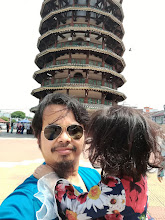Immeasurable Experience
Today was my last attendance at the Thadhani lab meeting. I presented my research findings that I have been cooking with Jess for the last 6 months. It's actually kinda sad, knowing that I would not be able to join the meeting anymore.
The lab is having its regular research meeting update every 2 weeks. There are at least 20 ongoing different researches at this lab only, spearheaded by Ravi himself. That does not include other labs that involves other consultants. That's how strong the research component here. Being presence among the researchers who have their papers published in NEJM, JAMA, KI etc is priceless. I got to know their views on certain topics, freely discussing on novel or controversial ideas in research. Ravi himself is actually quite a funny guy. There was no lab meeting that does not have laughter in it. He knows every single person in the group and acknowledge them (there are easily 20 people in each meeting). He is so humble that if the seating is full, he will get up and get the chair from outside himself. He listens to others.
Today, he touched a bit on sample size, but not in the usual calculative way. It was all about why and when is enough and whether it is hypothesis generating or comfirming hypothesis. It was not dry. Listen to the data, he says - even if the p-value is not significant.
The group do not just focus on a single research theme. Meaghan is doing something about hep C and CKD, Kabir is analysing data on sickle cell and ckd/cvd, Jess is doing something on pregnancy, Cammille is looking at gestational diabetes, Sagar is doing calciphylaxis, andrew is on hepatorenal, and christian is doing something with website - all different sorts of things. Of course Ravi cannot be good at each and every single clinical topic, but from thinking and research direction perspective, he has a lot of experience and superb at presenting his view.
I use the analogy of Naruto when I came back from Dublin. Come to think of it, it was not even close. It is more like Boruto, still in infancy, still there are a lot of things that I will need to learn, and that learning process should not stop once this sabatical period ends.
When I first arrived here, people said 6 months is not enough to do a good research project. I learnt so much more than just the need to publish a paper (which hopefully will also be a reality, Insya Allah). To immerse myself in a surrounding that constantly think about why things happen and find the inner push to do something different - this is an unmeasurable experience. More importantly, it provides me with the time to reflect within myself, what do I want to see in the future.

